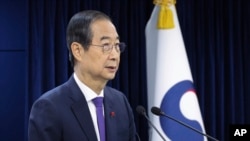South Korea's impeached prime minister told parliament on Thursday that "everyone" in a hastily arranged meeting of ministers expressed concerns about President Yoon Suk Yeol's martial law plan before he announced it on Dec. 3.
Han Duck-soo, who was briefly acting president after Yoon was impeached and suspended from power on Dec. 14, before being impeached himself, on Thursday joined acting President Choi Sang-mok, the finance minister, in facing parliamentary questioning over their role in the shock martial law decision.
"Everyone objected and expressed worry and raised the problems with this decision to the president," Han told a special committee, referring to the meeting where Yoon told some cabinet members of his intention to declare martial law.
The martial law lasted around six hours before Yoon rescinded the order in the face of opposition from parliament, but it sent shockwaves through Asia's fourth-largest economy and sparked a spiraling political crisis.
Choi told the committee that the biggest challenges in the country right now include the livelihood of the people and changes in the international order.
"There's the need to stabilize government administration," he said.
Yoon appeared on Thursday at a hearing in his impeachment trial at the Constitutional Court, which will decide whether to reinstate him or remove him permanently from office.
Senior military officials testified in the court about their role in deploying to parliament that night.
"My mission was to blockade the parliament building and the members' hall, and secure those buildings," said Army Colonel Kim Hyun-tae, who personally led about 97 special forces troops on the ground.
Kim said after they entered the building, his commander, Kwak Jong-geun, ordered him to get in the main chamber of the building where lawmakers had gathered to lift the martial law.
"(My commander) asked if we could get in because he said there shouldn't be more than 150 people," Kim testified, though he said he did not know the significance of that number at the time, or whether his commander meant lawmakers.
Kwak, the commander of the Army Special Warfare Command, has said he was told to stop 150 lawmakers or more from gathering, the quorum needed to vote down the martial law decree.
Kim said he told Kwak his troops were not able to enter the chamber. Eventually 190 lawmakers defied the cordon to vote against Yoon's decision.
Kwak took the stand at the court later on Thursday and faced Yoon in the same courtroom. Kwak has been saying that Yoon directly ordered him to "drag out" lawmakers but Yoon did not ask him to protect civilians or withdraw his troops, contradicting Yoon's claims.
Yoon has flatly denied any wrongdoing and allegations about attempted arrests of politicians. He has defended the martial law announcement two months ago as his right as the head of the state.
Yoon is in jail and separately faces a criminal trial on insurrection charges.





